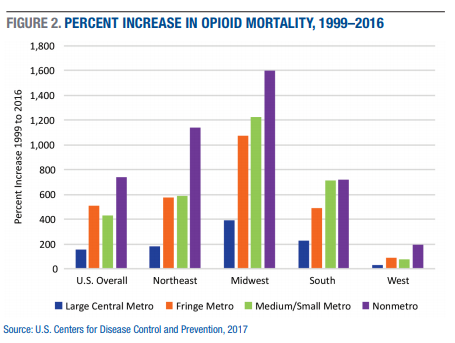Sign up for InDepthNH.org free weekly newsletter here.
By News release
DURHAM, N.H. – Opioid mortality rates were higher in urban than in rural counties but rates have increased more in rural counties over the past two decades, according to new research by the Carsey School of Public Policy at the University of New Hampshire.
The most dramatic increases in opioid deaths were in the rural Midwest where they were 16 times higher in 2016 than in 1999 and in the rural Northeast where they were 11.4 times higher.
“Although overall rates are higher in urban than in rural counties, rates increased more in rural than in urban counties across all regions over the last two decades,” said the researchers. “This two-decade increase has corresponded with significant economic stressors in some rural areas. Over the past 40 years, employment restructuring has led to the movement of many livable-wage production jobs out of rural areas while high-wage, high-skill service, finance and technology-based employment has become more concentrated in urban cores.”
The researchers also found that since 2010 the share of drug overdose deaths involving prescription opioids has declined but the share of deaths involving heroin and synthetic opioids has spiked in both rural and urban areas. Prescription opioids are still involved in a larger share of rural drug overdose deaths while heroin and synthetic opioids like fentanyl account for a larger share of urban deaths.
“Policy initiatives to date have been largely ineffective at addressing the opioid crisis in many of the hardest-hit rural communities, and the recent surge in fentanyl overdoes in large urban areas may be a precursor of what to expect in at-risk rural communities in the coming years,” the researchers said. “Existing interventions are unlikely to be effective without addressing the underlying social and economic factors that are plaguing the hardest-hit areas.”
The research was conducted by Shannon Monnat, Lerner Chair for Public Health Promotion and associate professor of sociology at Syracuse University and a Carsey fellow, and Khary Rigg, assistant professor of mental health law and policy at the University of South Florida.
The Carsey School of Public Policy conducts research, leadership development, and engaged scholarship relevant to public policy. They address pressing challenges, striving for innovative, responsive, and equitable solutions at all levels of government and in the for-profit and nonprofit sectors.
The University of New Hampshire is a flagship research university that inspires innovation and transforms lives in our state, nation and world. More than 16,000 students from all 50 states and 71 countries engage with an award-winning faculty in top ranked programs in business, engineering, law, liberal arts and the sciences across more than 200 programs of study. UNH’s research portfolio includes partnerships with NASA, NOAA, NSF and NIH, receiving more than $100 million in competitive external funding every year to further explore and define the frontiers of land, sea and space.
